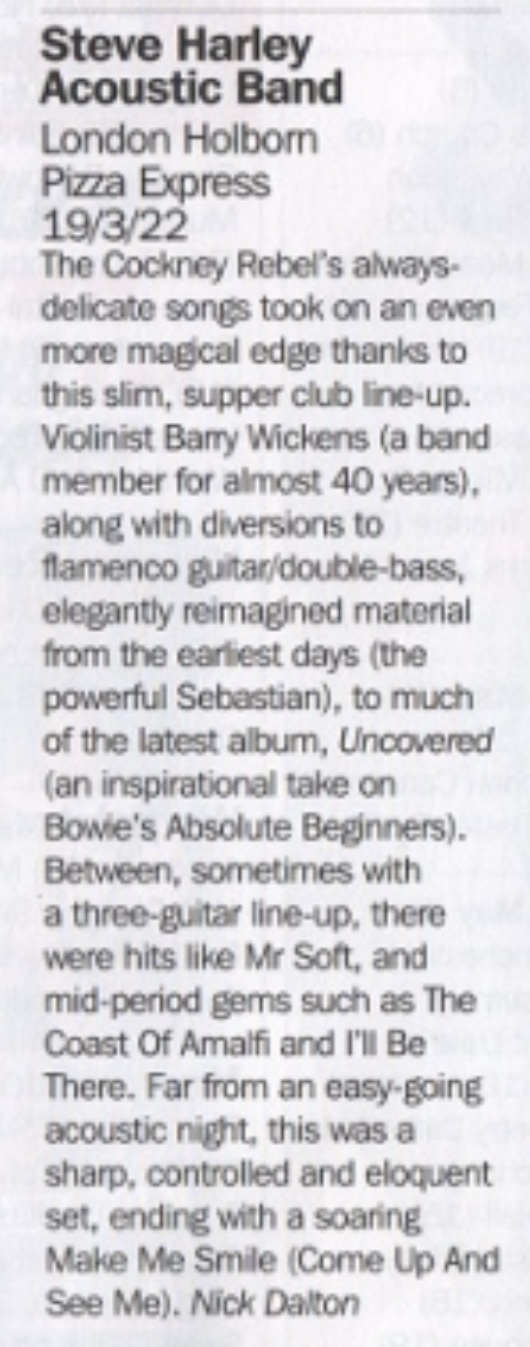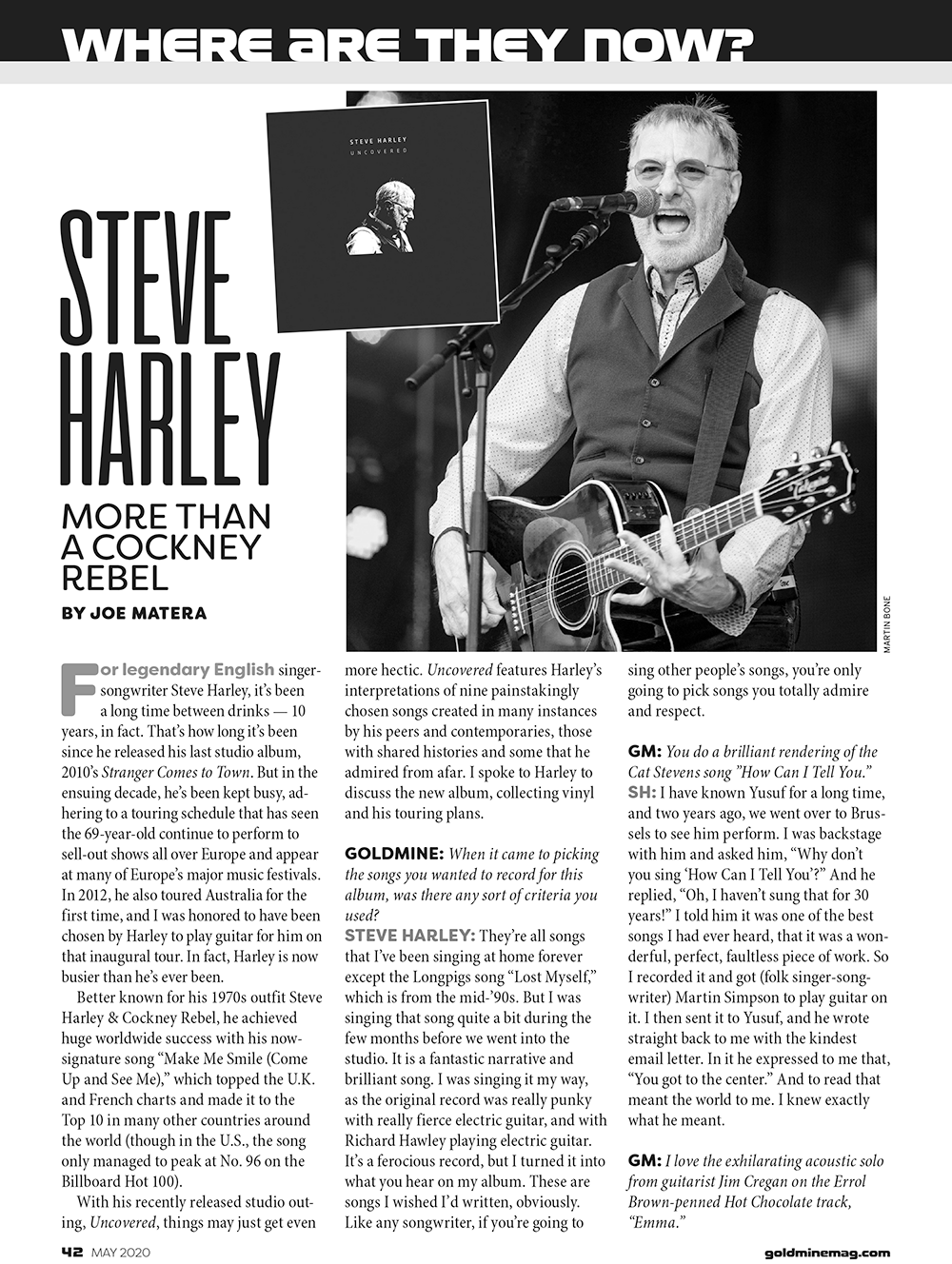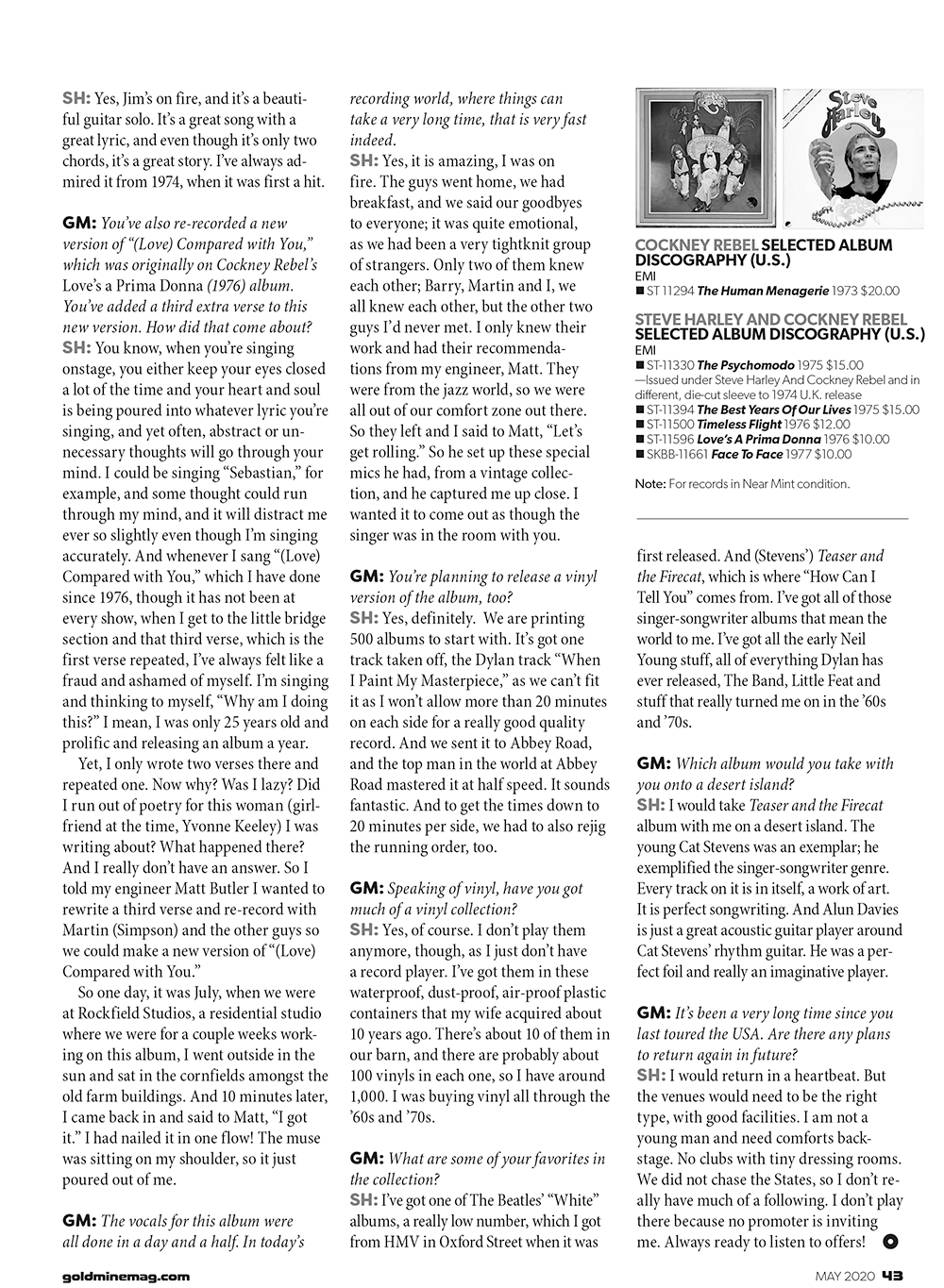Steve Harley Acoustic Band - London Holborn Pizza Express 19/3/22 - Record Collector Review
- Read: 1724 Times



Posted on November 15, 2017 by Joseph Azize
“The Coast of Amalfi” is a visionary, almost transcendent ode to a mystic insight. Lovingly fashioned by a very experienced and talented musician, it makes for a very special song, one of the best songs I have ever heard: a lyric elegy to match the cream of Schubert, Lennon/McCartney, Nina Simone or John/Taupin.
The Quality of Mercy
Strange to say, my favourite album of the third millennium so far, is Steve Harley & Cockney Rebel’s The Quality of Mercy released in 2005. I say “strange” because it was not even released in the USA, and did not chart in the UK or Australia. Yet, I think it is better than the brilliant Elton John/Leon Russell collaboration The Union, or Elton’s Songs from the West Coast and The Diving Board; or Wrote a Song for Everyone by Fogerty and friends (wonderful as they are), and far outshines any album by Adele, Sheeran or the other top-rated contemporaries who shift downloads for their companies (although I thought some of the songs on Adele’s 21 were very strong.) Perhaps some album I do not know of was superior, but I doubt it – we live in an age of accelerating decay, and the rot has set in for modern music.
But of those post-2000 albums I have heard, Quality of Mercy represents something unique: beautiful music written in the service of a constructive philosophy – the philosophy being that there is something intrinsically good in life, but we do not see it because our vision is limited and jaded, yet it can be refreshed by a sense of wonder.
Also “strange,” because I was never a huge Steve Harley fan, and I thought that after “Make me Smile (Come up and See me),” the quality of his work fell off. When he began off, Harley was doing the same sort of thing Bryan Ferry on the early Roxy Music albums, being so “progressive” that the music suffered, despite his possessing a great talent for melody and words. Songs such as “Sebastian” and “Tumbling Down” show a tremendous ability, but are rather too clever to bear repeated listening. On “Make me Smile,” Harley was able to tone down the pretentiousness, and deliver a song which has stood the test of time (try and hear the excellent cover by Suzi Quatro). The only defect that song has is that its lyrics are a little too obscure. However, as Harley has aged, he has matured, and although his later album Stranger Comes to Town is very good, I think that Quality of Mercy is his greatest achievement to date, and “Coast of Amalfi” is the jewel. Mercy also includes two other tracks which would be masterpieces crowning any other album: “Journey’s End (A Father’s Promise)” and “A Friend for Life.”
“The Coast of Amalfi”
First, Amalfi. Famous for its cathedral and stunning natural scenery on the Gulf of Salerno, it shares with Delphi and many other sacred sites, the feature of heights over water, so that light dominates the sun, the sea and the land. Next, the lyrics:
Light shone with a breath-taking energy; boats bobbin’ on the waterline.
Dusk settled but the flies didn’t bother me, I was high on the coast of Amalfi.
We sailed Positano to Capri, sat watching things unfold,
Drank shots in the shadow of Napoli, gettin’ high on the coast of Amalfi.
Scaled hills on the Island of Ischia, seeking shelter from the sun,
Pretty girls, pretty boys blow a kiss to her, she got high on the coast of Amalfi.
Bought leather on the streets of Sorrento. Bartered goods without shame.
In a dream I took a hold, didn’t let it go; life was high on the coast of Amalfi.
I dreamed I was lost in the history – Pompeii in all its glory.
Life’s home was a romantic mystery. Rome fell on the coast of Amalfi.
Sailed off in a ship full of lightermen, just flattered to deceive.
I was sad, I was sad at the sight of them. I got sad on the coast of Amalfi.
In that light you can see with a clarity many faults in your life Fate smiles on the good and their charity. I got saved on the coast of Amalfi.
My dream held this picture of beauty. My dream showed this breath-taking load. My dream had the quality of mercy. My dream had the patience of Job. My dream had this elegance and wonder. My dream paid the debts that I owed. I was high on the coast of Amalfi. I was high on the coast of Amalfi.
The Vision
This is probably a marijuana-stoked song. He is, after all, “high.” But then Amalfi does have that marvellous juxtaposition of cliffs and coast, so it could be something he feels while on the coast, looking at the water (or be doing so while smoking). My guess is that he was both on an elevated position overlooking the coast, and that he was partaking of what Gurdjieff called a “polorsmedekhtic substance.”
The first line is magnificent: “Light shone with a breath-taking energy.” That is, he received the impression of the light so strongly and powerfully, that the force he received from this impression meant that the body had to fast for a moment from inhaling the food of the air.
That first line sets the tone for the entirety of the first half of the song: it is extended by what follows, until it comes to the climax – a climax which because of its quiet understated strength can be sustained. If Harley had started screaming, as Bowie did way too often, it would have been histrionic. The substance would have been lost in the effect, as happens with all rap and modern dance. But he doesn’t. Harley is a real musician, and he is discerning. That makes the difference.
The light with which the song opens, delivering the life-energy, links up with the light which allows us to see with clarity our faults. It is, perhaps, a paradox, but the higher we are, the more impartial we are to everything; and the more impartial we are, the more we can see where we have gone wrong. It is our unwillingness to admit to our faults which makes us blind to them. It is also this light which reveals that “fate smiles on the good and their charity.” I have recently posted a transcript of something from Mr Adie where he says that our real lives are influences, and these live on after our deaths, in all whom we knew. Perhaps the same insight is behind this song, too.
The phrase “quality of mercy” comes from Portia’s famous speech in The Merchant of Venice. That allusion alone is enough to suggest the celestial feeling which Harley is invoking. But the reference to the patience of Job adds to the religious impulse. The sense of wonder he expresses also comes through in the music. If the earlier verses had almost effortlessly conjured the peace of being present to oneself in foreign land, as one moves through fresh sights, by the end, it is a litany of humility and simplicity, depth and height.
I have said little about the music. That is because it is hard to do it justice. There is something, calm and assured throughout it from the first note to the last. It bears the the master’s touch.
Harley is deep: you only have to watch his interviews to see that. Some of his music touches something rare and elevated, showing that this is a quality of soul he has which is at least sometimes, accessible to him. But “Coast of Amalfi” is his masterpiece.
Joseph Azize, 15 November 2017

